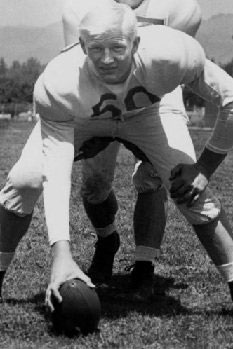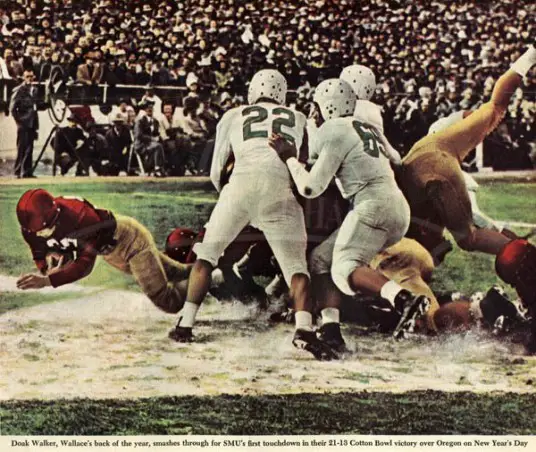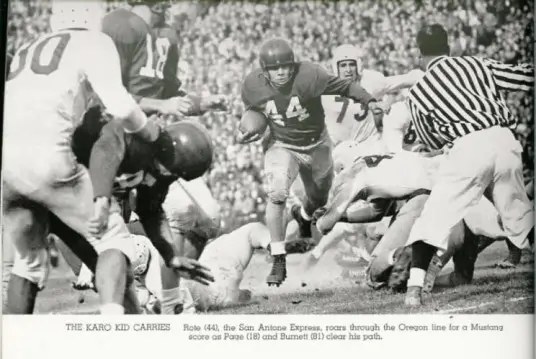 Immediately following the conclusion of the Pacific Coast Conference games on November 21, 1948, the Conference’s faculty representatives convened by telegraph to cast their votes for the P.C.C.’s representative in the 1949 Rose Bowl game. While the vote was 6 to 4 to send California to the Rose Bowl, the Conference never released the actual vote. It is certain the four California schools and Washington voted to send California. Who cast the sixth vote for California was not immediately noted. Eventually, it became known that Montana had cast the sixth vote, perhaps stemming from resentment over being dropped from Oregon’s schedule that season.
Immediately following the conclusion of the Pacific Coast Conference games on November 21, 1948, the Conference’s faculty representatives convened by telegraph to cast their votes for the P.C.C.’s representative in the 1949 Rose Bowl game. While the vote was 6 to 4 to send California to the Rose Bowl, the Conference never released the actual vote. It is certain the four California schools and Washington voted to send California. Who cast the sixth vote for California was not immediately noted. Eventually, it became known that Montana had cast the sixth vote, perhaps stemming from resentment over being dropped from Oregon’s schedule that season.
With California being awarded the Rose Bowl berth, the question was whether Oregon would be allowed to go to another bowl. Under existing Conference rules the only bowl games a member could play in on January 1st were the Rose Bowl and the Pineapple Bowl in Honolulu. Oregon had no interest in the Pineapple Bowl, desiring a bid to a major bowl. Oregon State would end up accepting a bid to the 1949 Pineapple Bowl. Other minor bowls approach Oregon about accepting a bid. The Harbor Bowl in San Diego was rejected by Oregon, as was an attempt by the Los Angeles American Legion to arrange a post-season game between the Ducks and Oklahoma.
Initially, North Carolina was the front runner to play Southern Methodist University in the 1949 Cotton Bowl. However, with the consent of the P.C.C., it was announced that Oregon had accepted a bid to play SMU in the 1949 Cotton Bowl game. This marked the first time a conference team would play in a New Year’s Day game other than the Rose Bowl or Pineapple Bowl. It would also be the last time until the early 1980’s.
Actually, Oregon’s missing out on the Rose Bowl bid was a blessing in disguise. Oregon would reap a substantial financial advantage by playing in the Cotton Bowl. Oregon was to receive approximately $105,000.00 for its appearance in the Cotton Bowl, which it did not have to share with the other members of the P.C.C. Oregon would also receive its share of the Rose Bowl proceeds.
One of the conditions Oregon insisted upon in accepting the Cotton Bowl bid was that three of its African-American players, Chet “Cool Poppa” Daniels, Woodley Lewis, and Win Wright, be allowed to play in the game. Keep in mind that the Cotton Bowl was to be played in a southern state where Jim Crow laws were enforced. Daniels, Lewis , and Wright would not be permitted to stay in the same hotel as the rest of the players and coaches. They would stay with a prominent African-American physician and his family. They were, however, allowed to dine with their teammates in a private dining room at the hotel. The three players would also be the first African-American players permitted to attend the post-game award ceremony at a private club.
As the Webfoots continued their preparations for the bowl game the issue of whether Norm Van Brocklin would turn professional after the game came up again. This time there was no denial by Van Brocklin. If he could graduate before the 1949 season began, Van Brocklin would be eligible to play professionally.
Coming into the game SMU was favored by a touchdown.
The 1949 Cotton Bowl game would be played before a crowd of 69,000 under partly cloudy skies and 50-degree temperatures.
SMU won the opening coin toss and elected to kickoff, deferring to receive the second half kickoff. The Mustangs, however, would score on their first possession of the game driving 73 yards, capped by a short Doak Walker touchdown run. Walker also kicked the extra point. SMU 7 Oregon 0. That would be the only score of the first quarter. Neither team would score in the second quarter, a quarter that consisted of turnovers by both teams. One other interesting bit of trivia is SMU’s use of the “quick kick” in the second quarter to keep Oregon pinned deep in its own end of the field. First, Walker. on a second down, quick-kicked (or punted) the ball 80 yards with the ball rolling out at Oregon’s 6-inch line. Later in the second quarter, Kyle Rote quick-kicked on a first down for 84 yards to the Ducks 12-yard line. The Mustangs only punted three times during the game but averaged 68.7 yards on those punts.
In the third quarter, Rote ran 36 yards for a touchdown. Walker’s point after touchdown was good and The Ponies took a 14 to 0 lead. Oregon’s only scoring opportunity in the quarter ended at SMU’s 6-yard line when a Van Brocklin pass fell incomplete in the end zone.
Oregon would finally get on the scoreboard in the fourth quarter when Van Brocklin passed 24 yards to Dick Wilkins in the end zone. Daniels missed the extra point kick. SMU 14 Oregon 6. SMU would respond on a touchdown run by Gene Roberts. The extra point was good. SMU 21 Oregon 6. The Webfoots were not yet done. Relying on a series of runs and passes Oregon moved to the SMU 1-yard line, where Bob Sanders smashed in for the score. Daniels kick was good. SMU 21 Oregon 13. Six minutes were left to play. Oregon would eventually get the ball back and had managed to move it out their own 47-yard line when the clock expired.
Statistically, Oregon had out performed the Mustangs. Unfortunately, several crucial penalties and dropped passes in the first half derailed the Ducks chances of winning the game.
Immediately following the game two Duck players signed pro football contracts. Dick Wilkins with the Los Angeles Dons, and Brad Ecklund with the New York Yankees. Others including Van Brocklin would later sign professional contracts. Three Webfoots, Wilkins, Jim Berwick, and Keith Decoursey left Dallas for a series of East-West All-Star games in Hawaii.
The 1948 season had been the greatest in Oregon history despite the bowl loss, and continues to be among one of the best in Duck history.
Related Articles:
Jim currently resides in Ellensburg, Washington where he has had the opportunity to watch former Ducks such as NaDerris Ward and Scott Grady play for Central Washington University, Jim’s alma mater. However, Jim was born in Eugene and attended Howard Elementary School, and what then called Colin Kelly Junior High School before moving to Washington. Jim began following the Ducks during the 1957 season and had the opportunity to watch a number of games at Hayward Field. Over the years, Jim has developed a wealth of knowledge about Oregon sports history. When not editing on Fanbase.com or working in his garden, Jim manages to find time to practice law.




